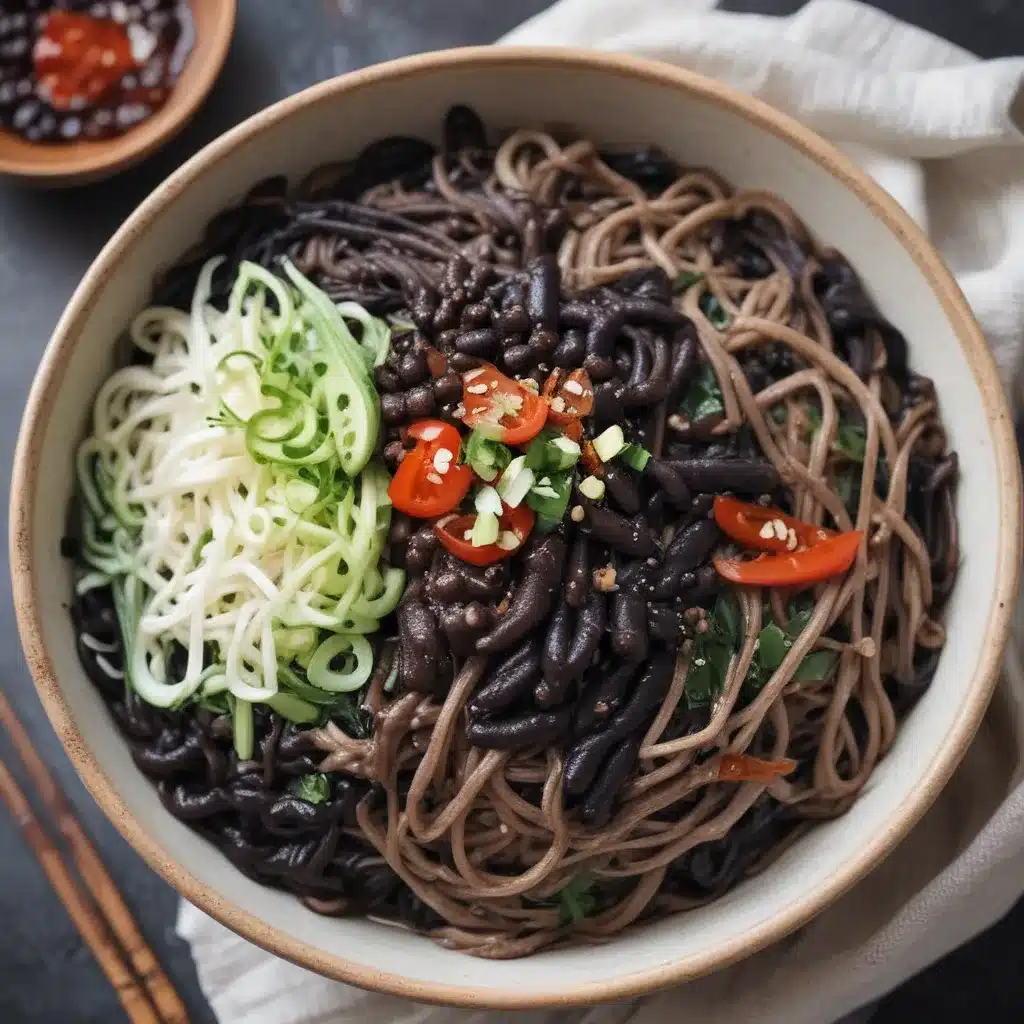
The Irresistible Allure of Korean Black Bean Noodles
I still remember the first time I tried Korean black bean noodles. It was a chilly autumn evening, and I had just moved to Boston to open up my very own Korean restaurant, the Korean Garden. I was feeling a bit homesick, missing the comforting flavors of the dishes I grew up with back in Seoul.
That’s when I stumbled upon a small, unassuming noodle joint tucked away in the heart of Koreatown. The aroma of sizzling beef and the glistening, inky-black noodles drew me in like a moth to a flame. From the moment I took my first bite, I was utterly captivated. The combination of chewy, al dente noodles, savory black bean sauce, and tender meat was nothing short of revelatory.
I knew then and there that I had to learn how to make this dish and share it with the people of Boston. After all, Korean black bean noodles, or jajangmyeon as they’re known in Korean, are a beloved staple of Korean cuisine – a true comfort food that nourishes the soul as much as the body.
The Origins and Evolution of Jajangmyeon
But what exactly are these mysterious black bean noodles, and where do they come from? Well, let me tell you a story. Jajangmyeon has its roots in the Shandong province of China, where a Chinese-Korean community developed a unique style of noodle dish featuring a savory black bean sauce.
This dish, known as zha jiang mian, eventually made its way to Korea in the late 19th century, where Korean cooks put their own spin on it. They swapped out the pork for beef, added fragrant spices like garlic and onion, and created the iconic black saucy noodles we know and love today.
Over the years, jajangmyeon has become a beloved part of Korean culinary culture. It’s a staple at Korean restaurants, a go-to for delivery, and a common homemade meal. In fact, it’s estimated that Koreans consume over 1 billion bowls of jajangmyeon every year!
The Nutritional Powerhouse of Jajangmyeon
But it’s not just the taste that makes jajangmyeon so special. This dish is also a true nutritional powerhouse. The key ingredient, black bean sauce, is packed with protein, fiber, and essential vitamins and minerals.
In fact, just one serving of jajangmyeon can provide up to 30 grams of protein – that’s more than half the recommended daily intake! The noodles themselves are also a great source of complex carbohydrates, which provide sustained energy to power you through the day.
And let’s not forget about the vegetables. Jajangmyeon is typically loaded with crunchy, colorful vegetables like onions, carrots, and cabbage, which add a boost of essential vitamins, minerals, and antioxidants.
So, not only is jajangmyeon delicious, but it’s also an incredibly nourishing and filling meal. It’s the perfect dish for those looking to fuel their body with wholesome, nutrient-dense ingredients.
Exploring the Diverse Variations of Jajangmyeon
But the beauty of jajangmyeon doesn’t stop there. This dish is incredibly versatile, with a wide range of variations that cater to different tastes and dietary preferences.
For the meat lovers out there, the classic jajangmyeon features succulent pieces of beef simmered in the savory black bean sauce. But you can also find versions made with pork, chicken, or even seafood, like shrimp or squid.
And for the vegetarians and vegans, there are plenty of plant-based options as well. Some restaurants offer a tofu-based jajangmyeon, while others get creative with mushrooms, eggplant, or a medley of seasonal veggies.
No matter your preference, there’s a jajangmyeon out there to satisfy your cravings. Whether you like it spicy, extra saucy, or loaded with toppings, this dish is endlessly customizable.
The Art of Making Authentic Jajangmyeon at Home
Of course, if you’re a true jajangmyeon aficionado, you might be tempted to try your hand at making it at home. And let me tell you, it’s a rewarding and immensely satisfying endeavor.
The key to mastering homemade jajangmyeon lies in the black bean sauce. This savory, umami-rich condiment is the heart and soul of the dish, and it requires a bit of time and attention to get it just right.
First, you’ll need to source high-quality fermented black beans, which provide the signature bold, slightly salty flavor. Then, it’s all about sautéing the beans with aromatics like garlic, onion, and ginger until the mixture is fragrant and caramelized.
Next, you’ll add a blend of soy sauce, rice vinegar, and a touch of sugar to balance out the flavors. The result is a thick, glossy sauce that coats the noodles and meat like a velvety blanket of deliciousness.
But the fun doesn’t stop there. Once you’ve mastered the sauce, you can experiment with different types of noodles, from chewy udon to springy Korean glass noodles. You can also get creative with your veggie and protein choices, making each batch of jajangmyeon truly unique.
Sharing the Joy of Jajangmyeon
As I’ve discovered through my own culinary journey, there’s nothing quite like sharing the joy of jajangmyeon with others. Whether it’s serving up a steaming hot bowl to a customer at my restaurant or teaching a friend how to make it at home, the reaction is always the same: pure delight.
People light up with excitement when they take that first bite, savoring the complex flavors and textures. And it’s not just the taste that captivates them – it’s the sense of nostalgia, the feeling of being nourished and comforted, that makes jajangmyeon so special.
That’s why I’m so passionate about introducing this beloved Korean dish to the people of Boston. I want them to experience the same sense of wonder and appreciation that I felt all those years ago when I first discovered jajangmyeon. It’s a culinary adventure that I’m thrilled to share with anyone who’s willing to explore the depths of Korean cuisine.
So, if you’re feeling adventurous and looking to expand your culinary horizons, I invite you to join me on a journey through the world of Korean black bean noodles. Who knows – you might just find your new favorite comfort food.
Visit the Korean Garden in Boston to try our authentic Korean black bean noodles!
